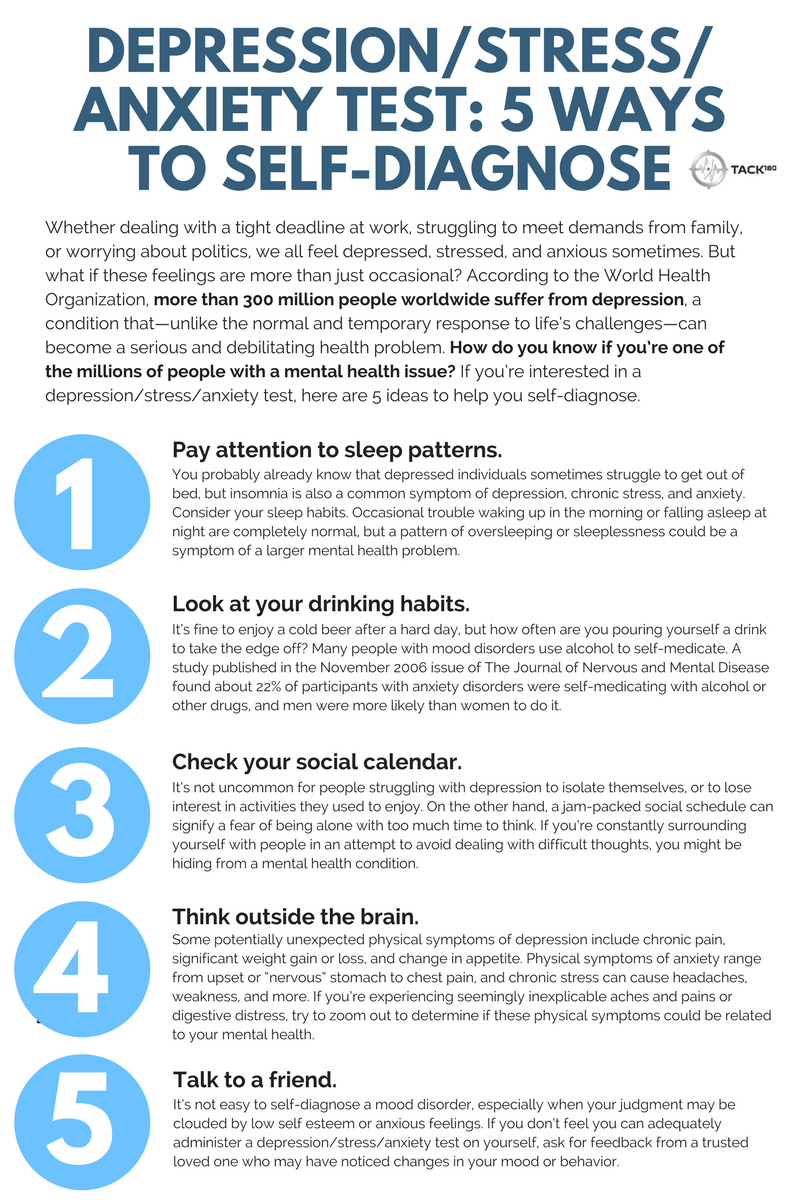Whether dealing with a tight deadline at work, struggling to meet demands from family, or worrying about politics, we all feel depressed, stressed, and anxious sometimes. But what if these feelings are more than just occasional? According to the World Health Organization, more than 300 million people worldwide suffer from depression, a condition that—unlike the normal and temporary response to life’s challenges—can become a serious and debilitating health problem. Chronic stress, too, has the potential to negatively impact every one of your body’s systems and can even lead to illnesses like heart disease. (For more on the effects of chronic stress, see my post here.) And while anxiety is a normal response to stress, it can interfere with day-to-day life when it becomes excessive. Anxiety disorders are so common the National Institute of Mental Health reports up to 18 percent of adults in America have one. How do you know if you’re one of the millions of people with a mental health issue? If you’re interested in a depression/stress/anxiety test, here are 5 ideas to help you self-diagnose.
1. Pay Attention to Sleep Patterns
You probably already know that depressed individuals sometimes struggle to get out of bed, but insomnia is also a common symptom of depression, chronic stress, and anxiety. Consider your sleep habits. Occasional trouble waking up in the morning or falling asleep at night are completely normal, but a pattern of oversleeping or sleeplessness could be a symptom of a larger mental health problem. If you have a Fitbit or other fitness tracker that automatically records the duration and quality of your sleep, closely examining your numbers may help you detect an irregular and unhealthy pattern.
2. Look at Your Drinking Habits
It’s fine to enjoy a cold beer after a hard day, but how often are you pouring yourself a drink to take the edge off? Many people with mood disorders use alcohol to self-medicate. A study published in the November 2006 issue of The Journal of Nervous and Mental Disease found about 22% of participants with anxiety disorders were self-medicating with alcohol or other drugs, and men were more likely than women to do it. Think about your drinking over the past couple months. Do you reach for a bottle (or other mind-altering substance) every time you’re stressed or upset? Using alcohol to handle uncomfortable feelings may be a sign you’re self-medicating a mood issue.
3. Check Your Social Calendar
It’s not uncommon for people struggling with depression to isolate themselves, or to lose interest in activities they used to enjoy. Are you holing up on the weekends rather than doing stuff like going out for meals, playing golf, or seeing a movie? Do you avoid calls from family and friends? You could be withdrawing as a result of depression or other illness. On the other hand, a jam-packed social schedule can signify a fear of being alone with too much time to think. If you’re constantly surrounding yourself with people in an attempt to avoid dealing with difficult thoughts, you might be hiding from a mental health condition.
4. Think Outside the Brain
When giving themselves a depression or anxiety test, many people only check for mental and emotional symptoms like sadness and excessive worry. But mood disorders have many physical symptoms, too. Some potentially unexpected physical symptoms of depression include chronic pain, significant weight gain or loss, and change in appetite. One analysis showed that, in a primary care setting, a high percentage of those seeking treatment for depression only presented physical symptoms. Physical symptoms of anxiety range from upset or “nervous” stomach to chest pain, and chronic stress can cause headaches, weakness, and more. If you’re experiencing seemingly inexplicable aches and pains or digestive distress, try to zoom out to determine if these physical symptoms could be related to your mental health.
5. Talk to a Friend
It’s not easy to self-diagnose a mood disorder, especially when your judgment may be clouded by low self esteem or anxious feelings. If you don’t feel you can adequately administer a depression/stress/anxiety test on yourself, ask for feedback from a trusted loved one who may have noticed changes in your mood or behavior.




Than you!
How do u know if u have anxiety because I haven’t been tested but I really think I have anxiety